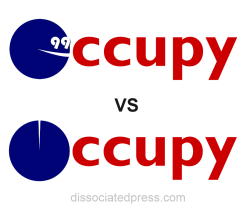Dude Man, You Stole My Link, You Nazi
[ Comments Off ]Posted on October 22, 2011 by admin in Lifestyle & Culture
The death of netiquette and the decline of quality of life on Facebook.
 Facebook may never actually die, but the neighborhood sure has gone to hell. |
One of the interesting things about social networking is that one of its key components – threaded discussion or comments – has been around since before the web even existed, beginning with the CBBS’s of the late 70′s. Like so many of the fine things in life though – like espresso drinks, literature, and proper grammar – once the commoner got involved, it all went to hell. I personally first noticed a serious decline in the quality of internet life around 2005. This of course was the year that MySpace first rose to prominence, but we can’t blame it all on sparkly animated unicorn graphics. It was also the year that “blog” became a household word (it was Merriam-Webster’s word of the year in 2004), the year that broadband access surpassed 50% of the US population, and the year that Google achieved near-total dominance of search, and made AdSense the most popular method of easy revenue generation on the web. This meant that at exactly the point where all the mouth breathers were finally getting on the web, they also had a readily-available way to self-publish, and two incentives to do so. First, an arrogant confidence in their ill-conceived beliefs fueled by watching Bill O’Reilly, and second, the ability to monetize their mindless rants by sticking ad content in their sites and spamming Google with SEO tricks (we’ve talked about content farms before). When you begin to look at the numbers for all the available ways to self publish – 800 million Facebook users, 200 million Twitter users, 150 million blogs (growing rapidly, by the way), and presumably another few hundred million Tumblr, LiveJournal, Flickr, and YouTube accounts – you realize that we now have as many content creators as consumers amongst the web’s 2 billion or so users. NO WONDER the whole concept of web courtesy known as netiquette has gone out the window. WE’RE ALL EXPERTS, goddamit, so SFTU LOL. Tell me you haven’t experienced one of the following things on Facebook: You share a really cool link, and your “friend” reposts it without a “via” or “hat tip” and gets more comments than you did, leaving you a little grumpy. You get engaged in a dynamic political dialogue, and suddenly find your blood boiling as it devolves down to a two or three person argument with massive paragraphs of polarized ranting. You post the coolest link that’s ever been posted on the web, and not a single person comments. Or maybe you share a link to an article about starvation in Somalia, and people “Like” it instead of commenting. These are all examples of things that I think have diminished the quality of the Facebook experience for many of us, and they all could have been easily avoided if people understood the basic principles behind the archaic concept of netiquette. And I realize that addressing “the Facebook experience” in a serious way seems almost comical, but let’s face it – millions of us check Facebook as or more often than we check email, and it’s a small but significant part of what may shape your mood in the morning. But it’s probably too late now; people more than ever are far more interested in their own thoughts than others’, and the analogy of Facebook and a civilized threaded discussion has one big weakness: good discussion boards have moderators, and the only moderators on Facebook are 400 million morons. I think I’m being kind here, I’m saying that more than half of Facebook users AREN’T morons, and I think you can agree that’s being pretty generous. So it’s probably too late for Facebook, but just in case you get sucked into the NEXT social network – assuming there is one – below are a few of the old netiquette terms and principles that might make the experience a little more enduring and enjoyable. Me, I’m boycotting Facebook until they enable sparkling animated GIF’s. Read the rest of this entry »
Problema – The Film
[ Comments Off ]Posted on October 19, 2011 by admin in Popular Media
What has 224 legs, 336 eyes, takes 5 years to mature, and lives for 95 minutes? One of the most thought-provoking films you’ll ever see, Problema.
 An aerial view of the “set” of Problema |
What would happen if you rounded up thought-provoking questions from people all over the world, then gathered about a hundred thoughtful people together in a huge circle, pointed cameras at them, and asked the questions one by one? Well, a cacophonous murmur would probably ensue, until you edited the results into some kind of cohesive whole, as director Ralf Schmerberg did with his epic film project Problema. The project was inspired by the Dropping Knowledge project, a global information sharing and media project founded in 2003. On a single day in September, 2006, over a hundred individuals – artists, scientists, writers, business people, and other thinkers – took their place around a huge circle in Berlin’s Bebelplatz. This was a powerfully symbolic choice – the Bebelplatz was the location of the infamous Nazi book burnings of 1933. With digital cameras pointed at each guest, hosts Willem Dafoe and Hafsat Abiola (founder of Nigeria’s Kudirat Initiative for Democracy) asked 17 of 100 questions that had been selected from the thousands that were submitted worldwide via the Dropping Knowledge project. The guests then responded in their own time, with the cameras all running continuously, all framing the guests in a tight headshot. Guest Wim Wenders – director of the film Wings of Desire – astutely pointed out the similarity between the resulting murmur and the way the angels in his film had no choice but to hear the thoughts of humans everywhere, which created much of the lush sonic backdrop of Wings of Desire. Schmerberg – Problema’s director – managed to capture much of this live feeling of the event by interspersing compelling, sometimes tear-inducing images with a lively mixture of both concise, eyes-at-the-camera answers, and almost out-take-like moments of verité in which the attendees fumbled with their thoughts or spoke in asides to the guests sitting next to them. The result is a thought-provoking documentary unlike any you’ve seen before. If you’re a caring person who lives in the so-called “First World”, a question like “Does our wealth depend on the Third World being poor?” might make you think “Well of course, and it’s a shameful tragedy”. But you’ll suddenly be forced to ponder things like what a bogus concept the “Third World” is in the first place, or how much freedom you have if you live in a powerful western capitalist country, when a sophisticated, educated person from Colombia points out that he for instance is only able to visit a place like Berlin because of a four day visa connected with the making of the film. He otherwise is barred from our “first world” as a second-rate global citizen who “has no right to enter our paradise” as he puts it. Although you may find Problema quite watchable on your own, you might find it a lot more interesting if you watch it with some intelligent friends, so you can discuss the world of questions it is likely to raise in your heart and your head. To view the film as a particapatory event, the Problema website offers a screening page that allows you to publicize the event, but you can just download it and watch it with friends if you like – it’s free, provided in multiple file formats, and can be downloaded by bittorrent or as a direct file.
Why Am I Writing eBooks When I Don’t Even Own A Kindle?
[ Comments Off ]Posted on October 16, 2011 by admin in Popular Media
The publishing world is going through a massive paradigm shift. Just in time to confuse the hell out of me.
 This might have SOMETHING to do with it. |
Me and eBooks go way back. Not quite as far back as the first time I used the wrong first-person pronoun on purpose, but at least back to about 1992, when I worked in one of the coolest bookstores ever: AfterWords, in Ann Arbor, Michigan. It was a store that mostly sold remainders, quality reprints, and small press stuff that was hard to find. One day while pricing a huge stack of of the hardcover version of I’m Only One Man, Regis Philbin’s biography, I casually mentioned something about how I’d just read in Wired magazine about the still-only-imagined eBook, and what a cool idea I thought it was. It took me a moment to notice the sudden silence around me. I looked up to find myself being stabbed through with a dagger-like look in the five eyes of my co-workers (one had just injured their eye and was wearing an eye-patch). The look in their eyes made it clear that they were collectively pondering the idea of paper-cutting me to death. “What, what, WHAT?”, I said. But I knew that it was just the book lover in them all that was causing this reaction. It was like suddenly I was the fireman from Ray Bradbury’s Fahrenheit 451 and I was there to burn all their books. As much as I agreed with them about the feel and smell of a comforting bound book, they really just didn’t seem to care about the number of trees left in the world, the idea that you could carry every book you’ve ever owned in a notebook-size device, or the idea that it would never wear out, and could be highlighted repeatedly without devaluing it. Well, we’ve come a long way since then. So far that not only is AfterWords long-since defunct, but even the corporate monsters that destroyed them are dying. This has not impacted my reading habits a lot, in spite of the fact that I don’t own a Kindle or an iPad. Although I have to say the Kindle Fire is very tempting, and who doesn’t want an iPad? Well, me, for the moment. But in any case, if I really want to read a particular book, I buy it or get it from the library. And far and away I do more short-form reading on the web. But this whole traditional book vs. eBook issue just became of critical importance to me. Why? Because I have a more or less finished book that I’m getting ready to peddle, and I just co-authored another book with a development partner. We’re developing a series of personal transformation products (we also maintain a sort of sandbox site called TheWellnessAddict.com) which will include a variety of books. So we submitted this first co-authored book to a publisher where my partner has been published before, and as we did so, Read the rest of this entry »
The Revolution Needs A Graphic Designer
[ Comments Off ]Posted on October 13, 2011 by admin in Lifestyle & Culture
As soon as Occupy Wall St starts using professionally printed signs and posters we can assume the movement has been hijacked, but could we at least lose the “20th century Soviet” and “60′s Power Fist” motifs?
 I’ve personally begun A-B testing for the revolution. |
If you’ve visited DissociatedPress.com with any regularity over the last few years, you know that I’ve been a bit annoyed with Wall Street since 2008 , when the industry built on gambling your hard earned dollars on sophisticated ponzy schemes to line billionaire bankers’ pockets with bonuses came tumbling down like a lost weekend in Vegas. Except when the hustlers lost their wad and woke up with a brain splitting hangover, they somehow managed to convince everyone to float them JUST ONE MORE TIME, swearing they’d mend their evil ways. Well, like any addict struggling with an addiction, they lied of course, slipped themselves a bunch more bonuses and wild parties just months later, and in the big picture, pretty much broke capitalism in the process. So it was with some excitement that I started watching the Occupy Wall St movement begin to gather steam last month; I even set up a site at OccupyAnnArbor.org, figuring if the movement didn’t arrive in my town on its own, I would HELP it arrive. No worries there though, within a few days of creating the site, about 1200 people had gathered spontaneously on one of the many Facebook groups that had suddenly popped up. Which is what I think the power of this movement is; it is genuinely grass roots and citizen-driven. People make fun of the cardboard signs being used at most gatherings, but to me those signs are a GOOD thing. As soon as we start seeing a lot of professionally-produced signs, we can probably assume the movement has been co-opted by a particular party or interest group. But that doesn’t mean we have to prove the “none of us is stupid as all of us” adage is actually TRUE. I think all the ninety-niners (see what I’m doing there?) should take a moment to read Frank Luntz’s Words That Work, and maybe Lovemarks, the brilliant book by Kevin Roberts about why we love the brands we love. The reason to read that first book is because Luntz helped the GOP understand the winning strategy of “it’s not what you say, it’s what people hear”, and the reason to read the second one is because it might help protesters understand that as much as using a black power fist makes you feel like you’re partying with Jimi Hendrix and Malcolm X, it makes the casual viewer think you’re a naive socialist who is out to undermine the American way of life. So while lots of artists like Shepard Fairey and Rob Sheridan are offering up free designs, I think even these talented designers are going a little too “oppressed laborer” with the imagery. So I’ve assembled a few images and ideas of my own about how to reframe the revolution a little. Feel free to chime in or share some interesting thoughts of your own, and if you’re looking for some inspiration, there’s a healthy collection of motifs here. Read the rest of this entry »
This Is Not The Droid You’re Looking For
[ Comments Off ]Posted on October 11, 2011 by admin in Technology
The iPhone 4s. Why talk to your friends when you can talk to your phone?
 This is not the Droid I’m looking for. |
I have tremendous admiration for parts of the ethos, and many of the devices that are Steve Job’s legacy. But every time I manage to convince myself that he was just a demanding eccentric genius, and not a total d-bag, I end up learning something new. Like today, when I learned that he used his wealth to (much like the tech royalty in the William Gibson novel Neuromancer) score himself a liver when he wanted one, putting himself ahead of other people that may have been more deserving. But enough personal-level billionaire genius bashing; what really irks me are the last two devices that Jobs introduced before beginning his journey into the After iLife (bless his soul). I already shared the agony of my unsatiated desires over a year ago, when I explained what Kate Moss and an iPad have in common, and bellyached about the Verizon whyPhone, and why I wasn’t all that excited about it. But now I have a new little quandary. I use Verizon, because as much as they suck in many ways, in my area they have the most reliable service of the Evil Triopoly of Mobile Providers available. As you may know, Verizon has a “new every two” plan, so I was finally thinking about breaking down and getting the iPhone, since I would probably be getting a sizable discount. But no-OO-oo. Apple has to go and release this “4s” thing the month I qualify. Great! A new, improved iPhone! Let’s see, unlike the OLD iPhone, this one offers….oh. Not much. But wait! You can TALK TO IT ! Finally a phone you can, er, TALK TO? I don’t want to talk TO my phone, I want to talk to PEOPLE, and talk to them ON my phone. Ah well. I may still break down and get one, but before I do, I’ll be checking out the Droid options. Although I was initially intrigued with both the HTC Thunderbolt and the Droid2, I’m not looking for something to tone my biceps, so the HTC was out, and as cool as the Droid2 is, compared to an iPhone, the interface feels like there’s an extra layer of glass between you and the “touch” part of the “touchscreen”. A likely choice? The latest version of the Motorola Droid X
. In spite of its decidedly unsexy and mysterious hump on one end, it is REALLY FAST, and has a nice length for someone like me, who shoulders their phone a lot. See a video review of the Droid X below. And two last thoughts. 1.) Am I just paranoid, or does Verizon download malware to your phone in the last months before your new every two? I could swear that on this and my last two contracts my phone started acting wonky exactly 60 days before the contract was up….and 2.) How does a phone that hasn’t been released yet get a five star rating? See the screen grab from the Verizon site below. Read the rest of this entry »
